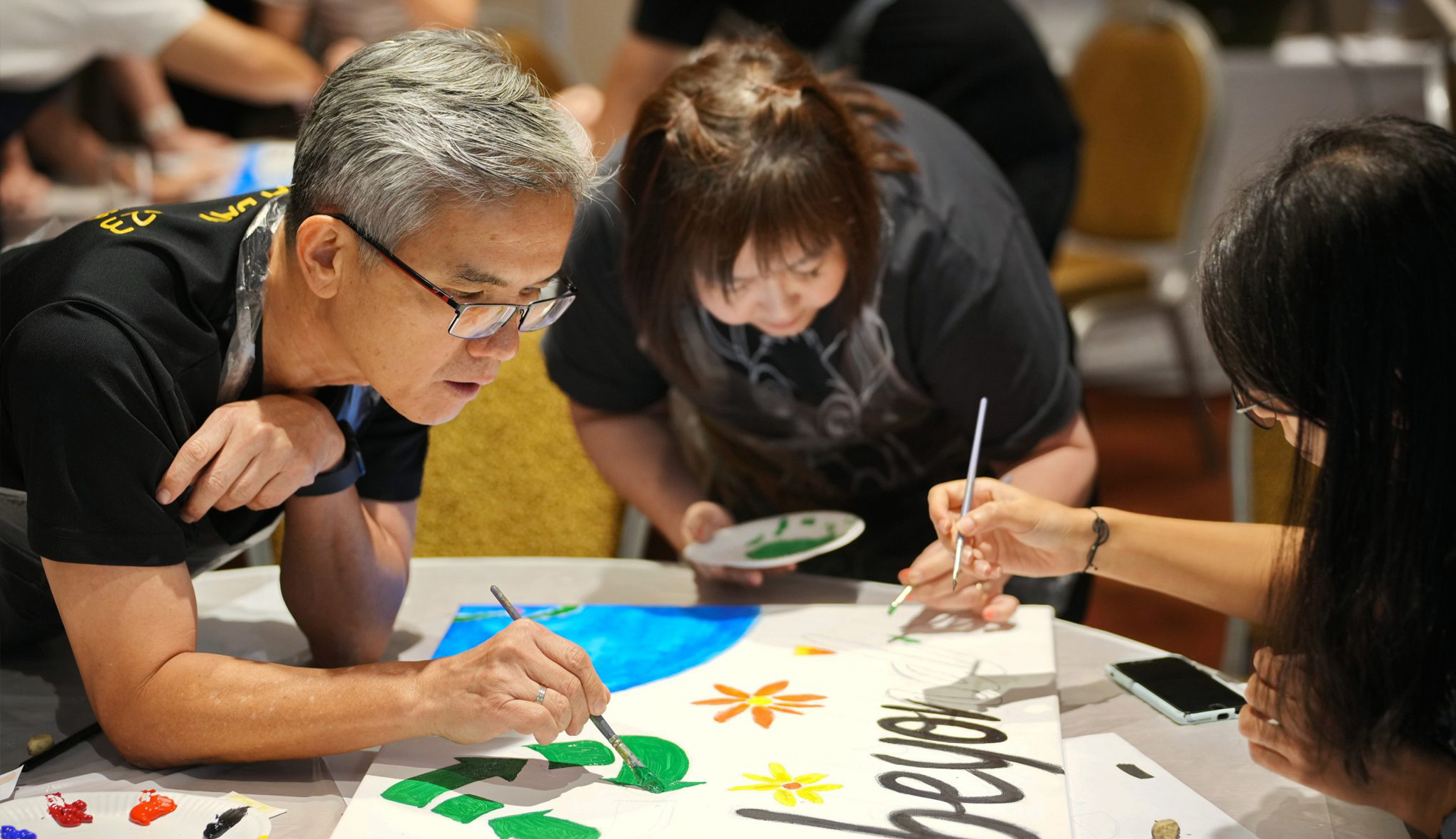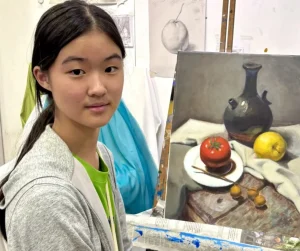Acrylic Painting on Canvas Team Bonding Art Jamming Singapore Visual Arts Centre

























2025新加坡“AI时代的梦想”儿童&青少年绘画大赛旨在通过艺术绘画作品展现人与AI(人工智能)的创意碰撞与互动。AI给我们生活中带来的福利以及我们与AI共同生活的美好家园。本次比赛为广大青少年提供了一个展示自我创意的平台。
参赛者可以通过绘画表达他们对人工智能的理解和想象。从科幻般的未来城市,到人与AI携手共创的世界,所有具有创新性和艺术表现力的作品都将受到欢迎。
本次大赛不仅是一场艺术创作的比拼,更是一次对未来科技与人文艺术融合的深度探索。我们鼓励参赛者发挥想象力,勇敢突破边界。
此比赛由新加坡视觉艺术中心主办,新加坡美术总会、新加坡现代画会、新加坡啸涛画会联合承办。此大赛由资深评委会画家们公平评比后,将选出“一等奖”、“二等奖”、”三等奖“,与“优秀奖”。各个奖项的获奖者将得到证书、奖金及奖品。一等奖、二等奖、三等奖与优秀奖的获奖作品。 视觉艺术中心将负责为获奖作品装裱框和策划作品展览。此绘画大赛的优胜作品将在视觉艺术中心展览厅展出,并邀请广大的艺术爱好者前来参观欣赏。
参赛作品提交电子稿件时间: 2025年8月1日至2025年9月30日开始接受参赛作品电子稿件。
参赛作品电子稿件要求:拍摄清晰,不得使用任何滤镜。
获奖作品提交原件时间: 2025年10月8日至2025年10月19日开始接收获奖稿件原件用于比赛展览。
(提交地址: Visual Arts Centre — 10 Penang Road 01-02 Dhoby Ghaut Green, S238469)
参赛作品的电子稿件提交截止日期: 2025年9月30日。( 逾期提交将不被受理)
比赛成绩公布日期:2025年10月6日午后12点(成绩将在我们的网站 visualartscentre.sg 公布并电邮通知获奖者)
(6)报名与参赛须知:
参赛者需要在2025年4月1日午后12点至2025年9月30日午后12点之间填写和提交表格(请点击这里),并在网上或线下支付报名费用($28)。
参赛者需根据提交作品时的年龄参加组儿童组: 8-12岁,B组青年组: 13-16岁。新加坡公民、永久居民和学生签证持有者均可报名参加。参赛者在参赛过程中需居住在新加坡。
在提交作品时,参赛者需提交作品并在作品背后注明:
1. 作品名称
2. 作者姓名
3. 作者家长的联系方式
4. 50字作品阐述
参赛作品的电子稿件提交截止日期: 2025年9月30日。( 逾期提交将不被受理)
本次比赛的评审团由视觉艺术中心,新加坡现代画会及新加坡啸涛画会的资深艺术家和专业评审组成,他们将从创意性、技艺水平、主题表达等多个方面对作品进行评分。
根据此次比赛的主题,参赛者可以自行发挥想象力进行创作,要求参赛者独立完成作品,要原创作品。创作的作品需要呼应大赛主题,偏题或跑题的作品将不被纳入评选范围内。
评委将从三方面给作品分数,构思创意和呼吁主题占60%、绘画技巧占30%、呈现方式占10%,三方面分数加一起才是评比的总分数。
每个组别的前33名将获得入围奖项,优先获得展览机会。
所有参赛选手均将获得电子证书,获奖六名选手将获得实体证书与奖金奖品,获奖六十名选手将获得实体证书与奖品。
儿童组(10-13岁):
青年组(13-16岁):
赛后作品展览日程:
展览时间: 2025年10月24日至2025年10月26日
展览地点: 新加坡视觉艺术中心展览厅– 10 Penang Road 01-02 Dhoby Ghaut Green, S238469
展览将获奖选手的作品将由视觉艺术中心进行裱框以及布置。所有展览作品将标价出售,所得收益将全额捐赠给新加坡的慈善机构。
请在扫描后的reference区域填写参赛者姓名

| 1)谁可以参赛? | 此次比赛的对象是8-16岁的儿童和青少年,新加坡公民、永久居民和学生签证持有者均可报名参加。参赛者在参赛过程中需居住在新加坡。参赛者需根据提交作品时的年龄参加A组—儿童组(8-12岁)或者B组—青少年组(13-16岁)的比赛。 |
| 2)比赛的评分标准是什么? | 比赛评委会从三个方面去评价参赛作品:立意/呼应主题(60%)、绘画技巧(30%)和呈现(10%)。作品会根据这三项的得分获得名次。 |
| 3)比赛主题是什么?什么样的作品算是符合主题? | 此次比赛的主题是《AI时代的梦想 》,我们希望看到参赛者们通过作品,展现人与人工智能的创意碰撞与互动。AI给我们生活中带来的福利以及我们与AI共同生活的美好家园。 参赛作品需要为原创作品。 |
| 4)报名什么时候开始什么时候结束? | 报名时间是2025年4月1日午后12点至2025年9月30日午后12点,在2025年9月30日之后报名的参赛者将不予考虑。 |
| 5)如何报名? | 参赛者需要填写报名信息提交表格(请点击这里)并且支付报名费用($28)。报名成功后一周内会收到确认报名的电邮。 |
| 6)作品提交的截止日期是什么? | 提交的截止日期是2025年9月30午后12点,在2025年9月30日午后12点01分或之后提交的作品将不予考虑。 |
| 7)如何提交作品? |
参赛者需要在2025年8月1日午后12点至2025年9月30日晚6点之间在网上通过连接提交作品的正反面照片。 在线上提交作品时,参赛者需提交作品并在作品背后注明: 1. 作品名称 2. 作者姓名 3. 作者家长的联系方式 4. 50字作品阐述 提交后会收到提交成功的电邮。 |
| 8)参赛作品尺寸有什么要求? | A3大小(297mm X 420mm) 横幅和竖幅均可 |
| 9)作品媒介有什么限制吗? | 参赛者可使用任意媒介,包括铅笔、碳条、碳铅、马克笔、丙烯、油画、水彩、水墨等或综合媒介。参赛者可以用素描纸、水彩纸、宣纸、油画布等来完成作品。 |
| 10)此次比赛奖品都有什么? | 儿童组(A组)和青少年组(B组)各选出:
|
| 11)比赛注意事项: | 参赛作品需是专门为此次比赛而创作的作品。画作创作时间应该在1/04/2025和30/09/2025之间。根据此次比赛的主题,参赛者可以自行发挥想象力进行创作,要求参赛者独立完成作品,要原创作品。创作的作品需要呼应大赛主题,偏题或跑题的作品将不被纳入评选范围内。参赛者需确保作品的状态可以参展和呈现,因为一等奖二等奖三等奖和优秀奖的得奖作品将在比赛画展颁奖典礼上展览,供大众欣赏。 |
Click and get to our WhatsApp
In the Batik Introduction Handkerchief Painting workshop, participants will learn the traditional art of batik, a wax-resist dyeing technique originating from Indonesia. The workshop begins with a brief history and overview of batik, highlighting its cultural significance and various techniques. Participants will then observe a demonstration of applying wax with tjanting tools and dyeing the fabric. Following the demonstration, each participant will design and create their own batik handkerchief, applying wax to create patterns and then dyeing their fabric. The workshop concludes with a group discussion, allowing participants to share their creations and reflect on their learning experience.